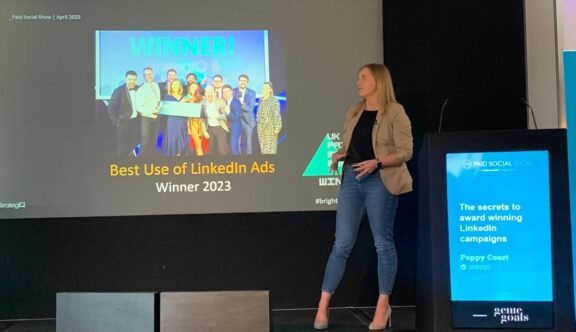Freshly wrapped from brightonSEO: here’s 6 top tips that we’ll be taking back to the office.
Buzzing with insights, advice and questions, brightonSEO is the place to be if you’re serious about digital marketing. As always, we gave our specialists across paid & social media, content & tech SEO and digital PR, the chance to soak up the insights from the world’s leading SEO experts. Here’s some of the things they loved and learned…
Key learning #1:
“In order to fit into the Metaverse space, we need to adapt and be creative.”
Rosie Howe, Paid Media Executive
Azahara Corrales’ Fringe session, Advertising in the Metaverse, provided a fascinating whistlestop tour through the metaverse, looking back at some standout advertising successes past and present. This included the likes of the Live Simulation Games Partnerships (SimsxMcDonald, FortnightxTravis Scott, which made $20 million from 1 online concert) and PokemonGo.
So how should businesses go about advertising in this brave new world? Corrales’ advice is basically to tear up the rule book – scratch thinking about B2B and B2C… it’s about B2A: Business to Avatar.
Rosie’s key takeaways for targeting ads in the metaverse:
- The use of filters within campaigns will be key: AR Filter Stats reveal 70% better memory recall than non-AR content and 4x more engaging than mobile video
- Consider non-conventional selling platforms – consider creating Non Fungible Tokens for example.
Key learning #2:
“Don’t be afraid to test new ad platforms – getting in there first can separate you from the competition and increase return on investment.”
Nathan Young, Paid Media Executive
Diversifying your paid social platforms by Cat Cumming used Battersea Dogs & Cats Home as a case study, serving as a useful reminder of the importance of keeping clients’ target audiences front of mind when seeking to engage with audiences on different social media platforms. The pros and cons to a variety of different social advertising platforms were well thought out, with a great example of how Zoopla was used to serve ads to encourage Battersea donations while people searched for pet-friendly houses.
Nathan’s key takeaways for getting a competitive advantage in PPC:
- While it’s important to keep your clients target audience front and centre in your mind, don’t be afraid to test new social media channels.
- If you get there before the competition, you will normally experience far lower CPCs and return on investment than trying to serve ads to the same audience on the same platforms.
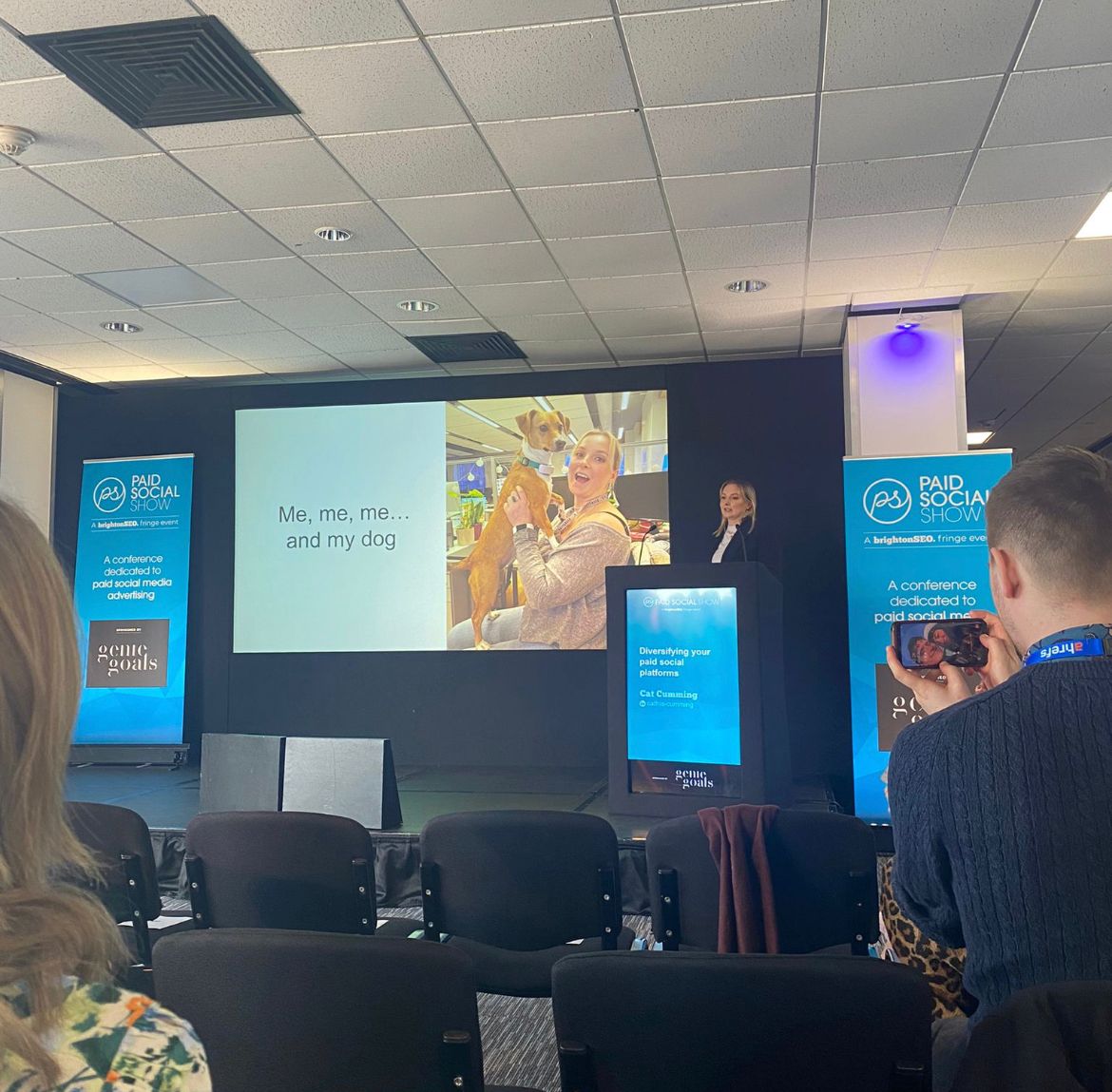
Key learning #3:
“A fantastic talk which hammered home the science behind smart automations in ecommerce. Basically, if you’re in ecommerce, then PMax is a must.”
Dale Olorenshaw, Head of Paid Media
As an agency with a specific lean towards helping ecommerce firms with their paid media strategies, we’re always keen to hear about new tactics. If this, then that – a guide to automation by Navah Hopkins was a fantastic deep dive into the logic behind when to use automations, reaffirming our thoughts around PMax (Performance Max) and its benefits in this space.
The session highlighted the fact that up to 15% of advertisers are still using outdated and legacy strategies, which is ultimately harming both performance and business growth. For example, citing the risk of using manual bidding around Responsive Search Ads (RSAs) and the importance of Exclusions in campaigns.
Dale’s key takeouts for optimising Paid in e-commerce:
- The larger the budgets, the easier/faster time algorithms will have optimising your account.
- When optimised correctly, Performance (PMax) in e-commerce has a 84% improvement on ROAS and a 2,100% improvement on profitability.
- When launching PMax campaigns, still continue to ensure you have a well-thought and high performing Google Search campaign structure, as Google will prioritise Search targeting over PMax
Key learning #4:
“We’re always striving to achieve Feature Snippets, but Niki’s talk has highlighted where we can level up what we need to be doing to cinch these more frequently.”
Jenny Molloy, SEO & Content Manager
As a content SEO, gaining featured snippets – those special snippets of text that appear at the top of Google’s search results – are a cause for celebration given that they not only help quickly answer search queries but increase share of voice, CRV and authority.
Niki Mosier’s session, the value of featured snippets, provided valuable insights to validate our thinking, as well as learn some insights to help us get to that holy grail of #0 rankings. We loved the stats such as: 77% of featured snippets start with ‘Why’ and that 14% blog pageviews come from URLs that are ranking for featured snippets.
Jenny’s key takeaways for levelling up featured snippets:
- Refresh content regularly in order to gain coveted snippet positions –
- 70% of content ranking #0 was published in the last 2-3 years.
- FAQ schema markup should be implemented for any content that wants to rank for featured snippets.
- Focus on URLs that are on page 1 for targeting featured snippets – URLs on page 2 or 3 will be an uphill struggle.
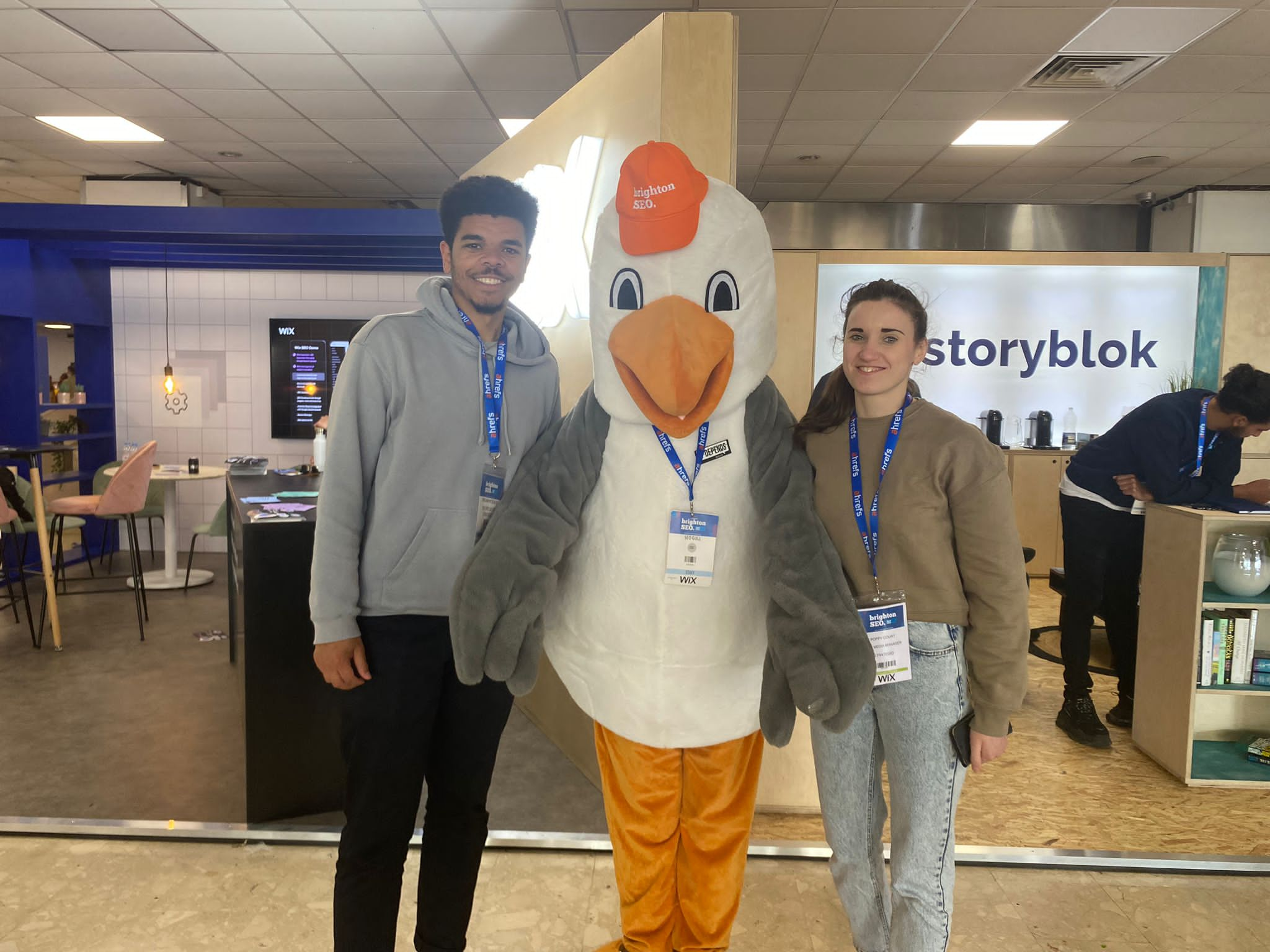
Key learning #5:
“In a world where AI becomes the norm, brand, voice, and tone will be the key to stand out from the crowd.”
Jordan McKenzie, SEO Specialist
With the emergence of AI, brand voice and tone is now more important than ever – that’s the top line, according to this very interesting and thought provoking talk by Carlos Meza. In his session, Is content the king in modern SEO? Carlos took us through a journey of SEO content; the past, present and future. He articulated that content is still king when it comes to SEO, but with an abundance of AI written content emerging, it’s important to write quality, human-centric content that resonates with your audience.
This was set against some fascinating stats, for example: that we spend, on average, 473 minutes a day consuming content – half of our waking hours. There was a huge focus on being authentic and relatable with future content and to find a more human approach through storytelling and evoking emotions.
Jordan’s key takeaways for the future of SEO content:
- Keep the customer at the centre of your content – put the needs of the customer before ours.
- Leverage Machine Learning and AI. Make it your friend and not your enemy.
- Microaudiences – Instead of trying to reach out to and appease everyone, find the ‘smallest viable’ audience.
Key learning #6:
“Are your fancy fonts and lengthy content really bringing value? By focusing on page speed over conversions as a KPI, charities are leading the way for environmentally responsible SEO, as well as improving UX.”
Imogen Jones, SEO Executive
Did you know that the internet produces roughly 4% of total global greenhouse gas emissions? We didn’t, and Nick Vines’s session, Why page speed matters… without mentioning conversions once truly stood out from the rest by explaining why the third sector is leading the way for environmentally conscious SEO strategies. This fascinating session was packed with practical takeaways on how all organisations can learn from the third sector.
Immie’s key takeaways on environmentally conscious SEO:
- Making sites faster through more efficient processing power is the best way to reduce an organisation’s carbon footprint.
- Opensource cms is the way forward – wagtail websites Nasa, Google, NHS, gov websites are industry-leading examples.
- Consider reducing the amount of content – do you really need 2,000 words, those videos, and animations? Even the fonts we use can add weight; use system fonts like Arial or Times New Roman.
- Reduce Javascript. Use server caching, decreasing back and forth needed by server, use clean code – keep streamlined. Use a data centre close to your users (CDNs).
Finally: The secrets to award-winning LinkedIn Campaigns
(This one’s on us… thanks Poppy Court.)
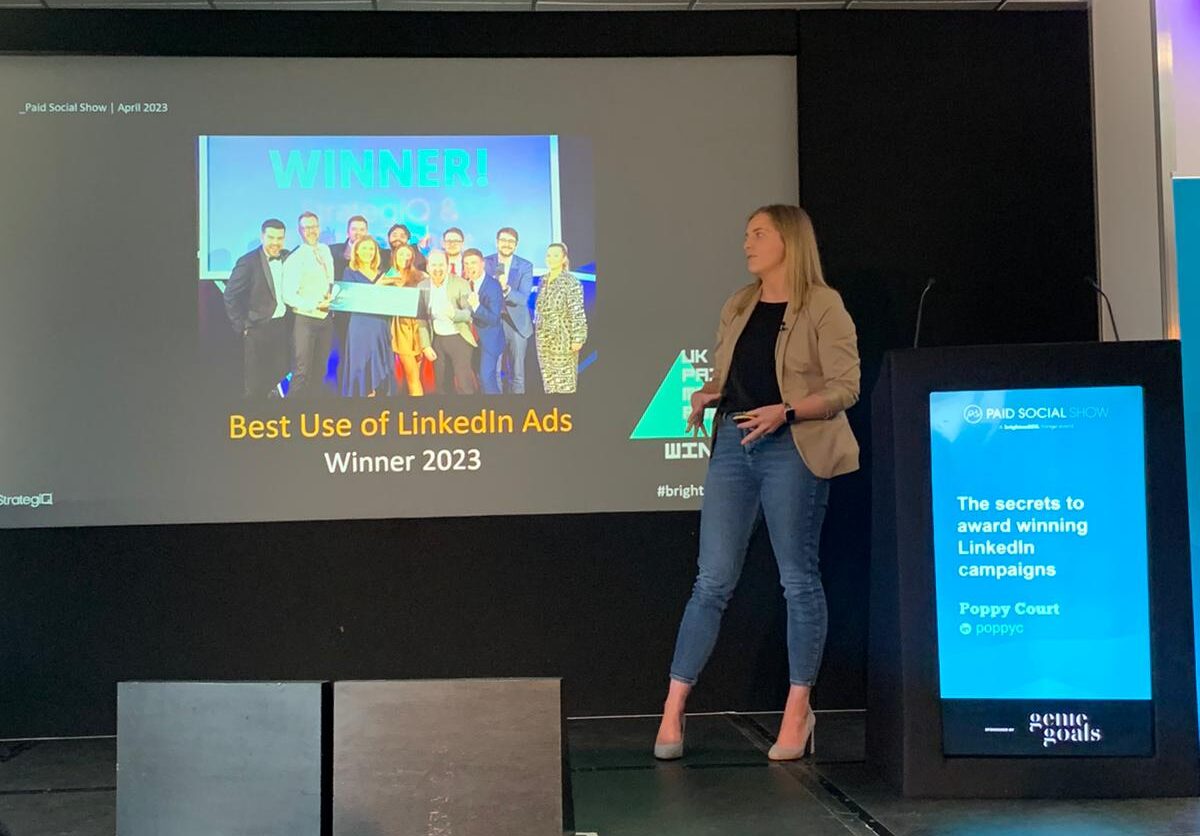
When it comes to creating award-winning LinkedIn Campaigns, we know a thing or two…yeah, we’re blowing our own trumpet here, hot from our award-wins at the Paid Media Awards.
But we’re not ones to keep our insights to ourselves, as Poppy proved as she took to the stage with her tips to win awards for your LinkedIn ads (and create loads of leads too, naturally).
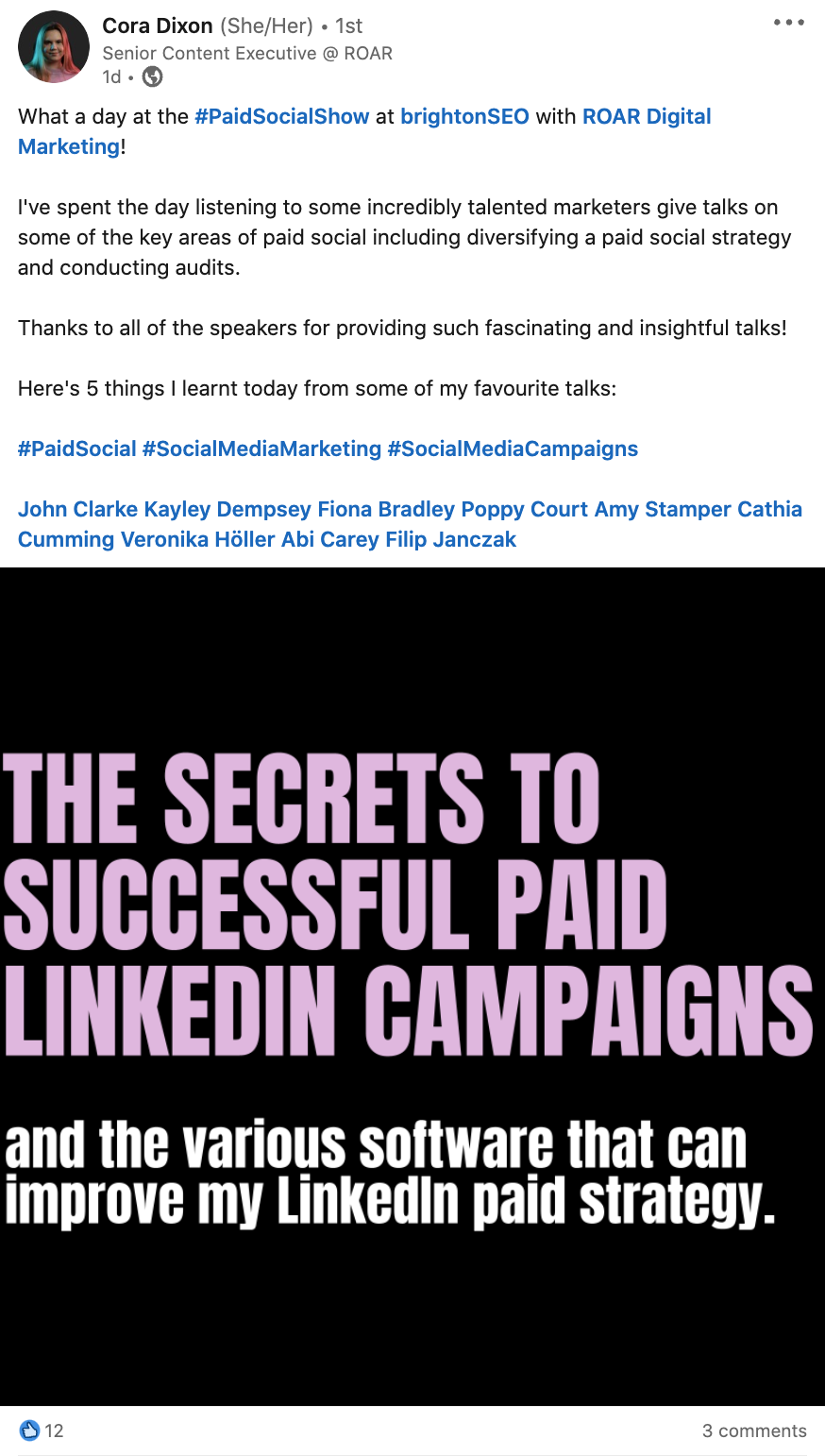
Poppy’s tips on how to win awards for your LinkedIn ads:
- Gain insights of the company: understand the business, how much they are willing to invest, use tools (LinkedIn tag etc.) to complete some audience and competitor research.
- Distil all insights of the company into a one liner which can be used to link with the overarching strategy.
- Consider using a metric map which allows for a visual representation of each channel’s purpose in driving the primary objective.
For much more, make sure to check out Poppy’s deck.
